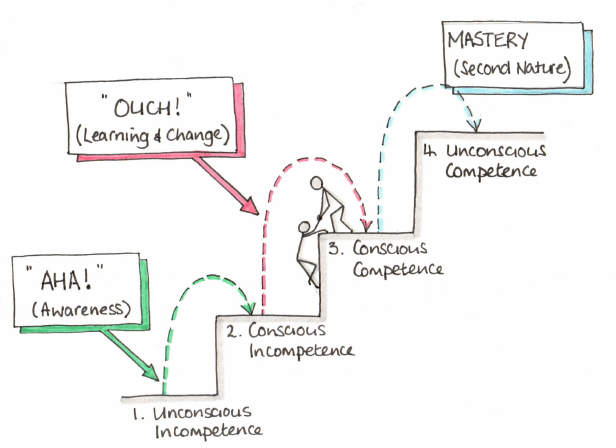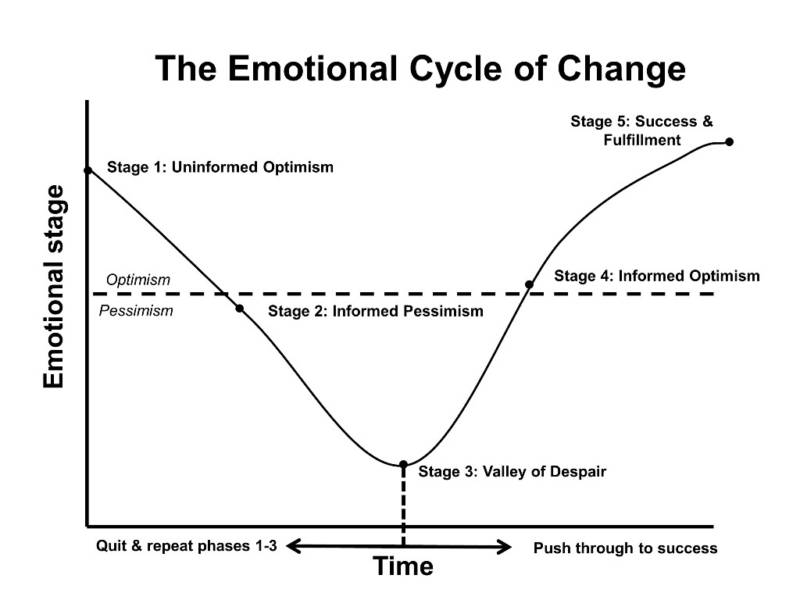Checkpoints In The Journey Of Excellence
Checkpoints Along The Journey
We touched briefly on several of the checkpoints of excellence
in a previous blog. Now, we’ll delve deeper into all 5 checkpoints. Each stage represents a point of consciousness in the stair step towards excellence. Some checkpoints will have more detailed subpoints as you’ll see in the details below. For illustration purposes, I have included two graphics. One is from the UKCPD Blog and it shows the stages of competence. The other is from InFocus Leadership Solutions and it covers the emotional stages of change.
Now that we know what the checkpoints are, lets unpack them further.
01 - CHILDLIKE UNCONSCIOUS COMPETENCE (CUC) - as a child we are 100% in our element of discovery and growth. Excellence comes naturally and we aren’t yet aware of our incompetence. We aren’t afraid to try something and fail at it. We view ourselves as invincible and soak in information like a sponge. Eventually our child-like innocence is replaced by growth and a desire that we don’t understand.
02 - UNCONSCIOUS INCOMPETENCE (UI) - we want, but we do not make the connection to the fact that our want is a signal of excellence not yet expressed. For many, the search for satisfying our wants is destructive. There are temptations that lure the unconscious competent person abound such as sex, lust, drugs, alcohol, gambling, co-dependence... and the list goes on. The road of the UI is littered with broken, shattered people. This stage towards God-given purpose focuses on the unsatisfied desire. We want more and yet we don’t understand our exact desires. Essentially, we don't know what we don't know.
03 - CONSCIOUS INCOMPETENCE (CI) - we want, and we know that the want is tied somehow to our lack of excellence. Unlike UI, where we haven’t found a need to change, CI is where we begin to realize our incompetence of excellence. In the Conscious Incompetence stage, we become aware of what we want, but haven’t put together a plan to accomplish our goal of excellence. A great example of this stage would be when a person realizes that they are out of shape. The realization is there, but the steps toward changing their situation have not yet been developed.
04 (a) - PRE-CONSCIOUS COMPETENCE (PCC) - we begin the journey to articulate the random wants into a program that evolves into an ever-increasingly clear understanding of our unique God-given design and the expression of that design. We haven't reached CC yet because we must go through emotional changes (see illustration above). This stage is a large part of the active journey of excellence. We begin to develop a plan toward achieving our goals. Going back to the fitness example, this is where a person develops a plan toward getting into shape and then begins to execute that plan. There are multiple substages in PCC which represent the emotional ups and downs that an individual will face before reaching Conscious Competence.
04(b) - CONSCIOUS COMPETENCE (CC) - once we reach the final emotional stage of Success and Fulfillment (SF), we can now be confident in who we are and what we bring to the world. In the CC stage we are aware of our pursuit towards out goal of excellence, we have emotionally processed our incompetence and are actively engaged in growth towards excellence. Excellence has not yet matured, but we’re working hard to reach that desired outcome. Looking back on the example of fitness, CC would look like actively engaging in a fitness plan and seeing consistent results. The plan may still need to be tracked, but we are committed and establishing the healthy habits that lead to excellence.
05 - MATURE UNCONSCIOUS COMPETENCE (MUC) - we operate in a program most of our waking hours expressing our unique design with little conscious effort. It is only here that our excellence has become a natural way of life. In the fitness analogy, this stage represents the achievement of goals and a changed perception of life. A person who has reached this stage will have formed habits that effectively continue to perpetuate their goal of excellence.
Share with others















